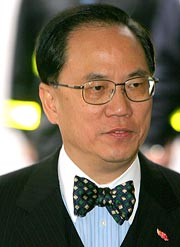The entire pro-democracy opposition walked out, leaving the rest of the 60-member Hong Kong legislature to vote 32-0 in favor of the new surveillance bill. This new bill gives authorities increased powers of intrusion, such as tapping phone lines, intercepts of mail and email, undercover infiltration, and other types of physical surveillance.
 In and of itself, increased surveillance powers should not necessarily be cause for alarm. The heart of the matter—and what legislators and human rights activists need to resist—is the fact that the two bodies charged with authorizing surveillance and intercepts, a panel of judges and an independent judge, will be appointed by the city's chief executive, Donald Tsang (曾蔭權). Given the latter's pro-Beijing position, what the new bill means is that it will be easier to spy on political opponents, as well as on conversations between sources and reporters (as during the case of the 2003 SARS outbreak, for example), or lawyers and clients than ever before—or at least to give the impression that it is being done legally.
In and of itself, increased surveillance powers should not necessarily be cause for alarm. The heart of the matter—and what legislators and human rights activists need to resist—is the fact that the two bodies charged with authorizing surveillance and intercepts, a panel of judges and an independent judge, will be appointed by the city's chief executive, Donald Tsang (曾蔭權). Given the latter's pro-Beijing position, what the new bill means is that it will be easier to spy on political opponents, as well as on conversations between sources and reporters (as during the case of the 2003 SARS outbreak, for example), or lawyers and clients than ever before—or at least to give the impression that it is being done legally. Despite Hong Kong Secretary for Security Ambrose Lee's (李少光) assurances that there is "a good balance between effective law enforcement on the one hand and the protection of privacy on the other," the new bill doesn't bode well for Beijing's opponents. How much fate can Hong Kong residents have in the supposed just power-granting bodies when, a year ago, Tsang issued an executive order allowing law enforcement agencies to eavesdrop electronically on suspects after courts had repeatedly thrown out the case on the basis that it violated the suspects' civil rights? What this bill does, among other things, is provide cover, through the illusion of independent judges, for the same type of disregard for civil liberties. Put differently, it closes the gap between the chief executive and the exercise of intrusive powers.
The adoption of the new bill is worrying, not so much for the added powers that it grants as for its mockery of truly just warranted powers. Although Lee claims that the new law is "crucial for the territory's public safety," (in other words, servitude to or not too great a distance from Beijing), what it will likely ensure is that opposition to the ever-encroaching central authority, along with support for such worthy causes as democracy, political transparency and even Taiwanese independence, will be more easily monitored and stifled.

No comments:
Post a Comment